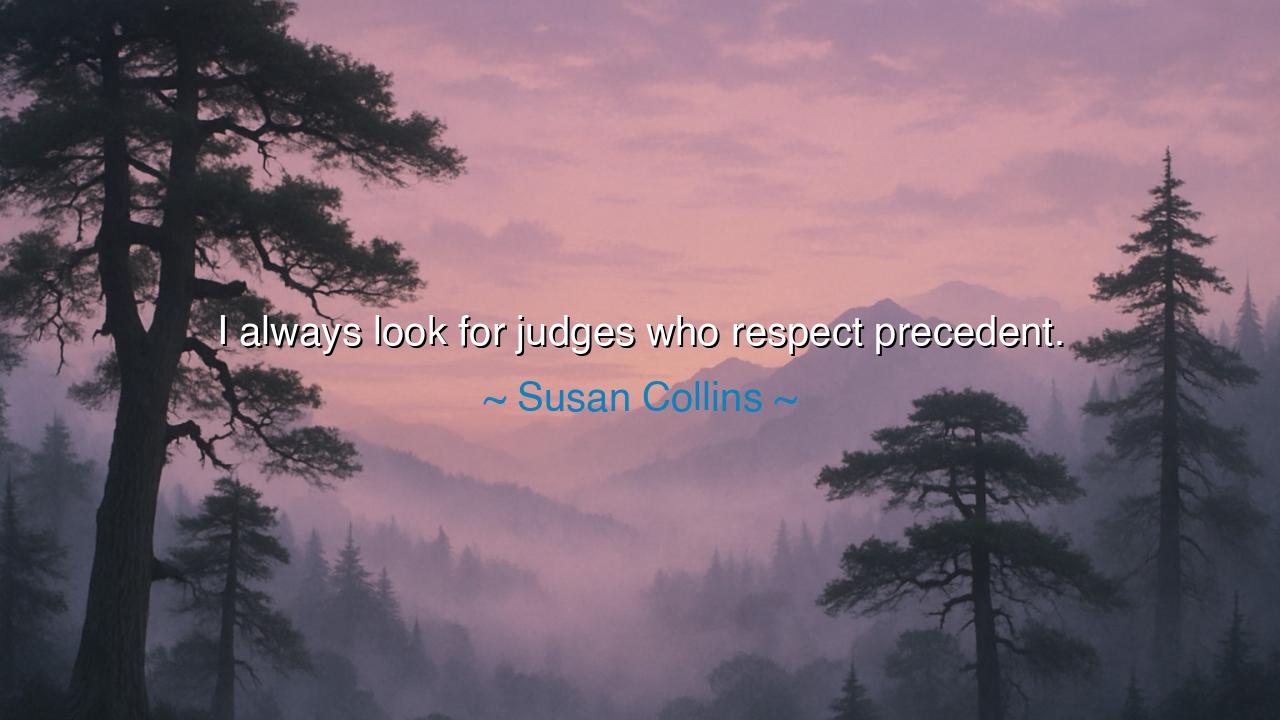
I always look for judges who respect precedent.






The words of Susan Collins—“I always look for judges who respect precedent.”—carry the weight of a truth as old as law itself: that the stability of a people rests not only on the wisdom of its rulers, but on the reverence for what has already been judged, decided, and established. In these words lies the recognition that justice is not a thing to be reinvented with every sunrise, but a sacred thread woven across generations. To respect precedent is to honor the wisdom of those who came before, to bind the present to the past, and to shield the people from the storms of arbitrary power.
The ancients themselves understood this. In Rome, the Twelve Tables and the later writings of jurists formed the backbone of law. The principle of stare decisis—to stand by things decided—became the shield that gave citizens confidence that justice was not a shifting tide, but a stable ground upon which to build their lives. Collins, in her words, invokes this ancient wisdom: that a judge who respects precedent is one who respects not only the law, but the people’s need for consistency, fairness, and trust.
Consider the story of King Solomon, who was revered for his judgments. When the two women came before him, both claiming the same child, his ruling was not only wise, but it established a standard—a precedent—that guided others in their understanding of justice. If every judge were to ignore what came before, society would be as a ship without anchor, tossed endlessly by the winds of opinion. Precedent is the anchor that holds steady the vessel of law, and Collins’ words remind us that to lose this anchor is to invite chaos.
Yet her words also carry warning. For though precedent is sacred, it is not unbreakable. There are times in history when old laws, though long established, proved unjust. Slavery itself was once upheld by precedent; segregation was defended by it. In such moments, judges of courage dared to challenge precedent, not out of arrogance, but out of higher reverence for justice itself. Thus, Collins’ call to respect precedent must be understood with balance: respect what has been decided, unless higher truth demands that it be overturned.
The emotional force of this teaching lies in its reminder of humility. A judge who respects precedent acknowledges that their wisdom alone is not enough, that they are part of a greater chain of reasoning that stretches across time. To ignore precedent is to claim one’s own mind above the collective wisdom of ages. To respect it, however, is to walk with humility, acknowledging the strength of tradition while still remaining alert to injustice.
The lesson here extends beyond courts of law. In our own lives, precedent is the memory of past lessons, the accumulation of choices, mistakes, and triumphs. To respect precedent is to learn from experience, to honor what has proven wise before. Yet we must also be discerning, for not every habit, not every tradition, is worthy of preservation. The noble path lies in balance: hold fast to what is just and enduring, but be willing to let go of what was built on error.
Practically, this means reflecting on your own life’s precedents. Ask yourself: what choices have I made that deserve repeating? What lessons from my ancestors or my past should guide me now? At the same time, ask: what patterns must I break, what false precedents must I leave behind, so that truth may rise? By doing so, you will live as Collins counsels her judges to rule—with both reverence for history and courage for the present.
Thus, Susan Collins’ words shine with a wisdom rooted in the ages: to respect precedent is to respect stability, humility, and the fabric of trust upon which societies are built. But to respect it wisely is also to discern when justice itself demands change. And so the teaching is clear: honor the wisdom of the past, yet do not be enslaved by it. For in this balance lies the true path of justice—for nations, for judges, and for every soul who seeks to live rightly.






AAdministratorAdministrator
Welcome, honored guests. Please leave a comment, we will respond soon